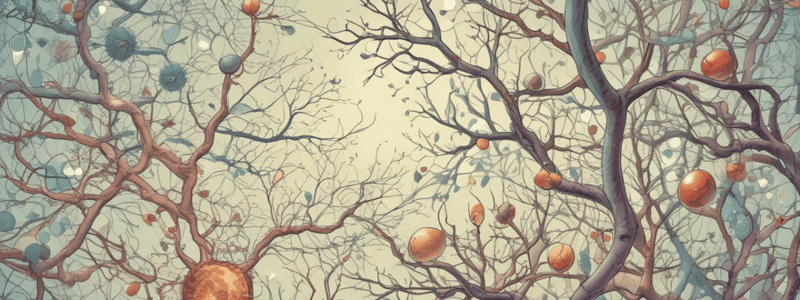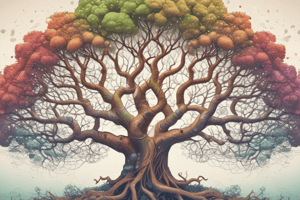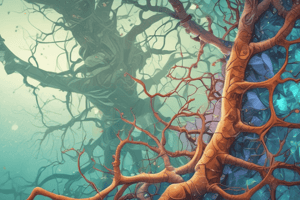Podcast
Questions and Answers
What is the branch of biology that studies the interactions between organisms and their environment?
What is the branch of biology that studies the interactions between organisms and their environment?
- Ecology (correct)
- Botany
- Microbiology
- Zoology
What is the function of the nucleus in a cell?
What is the function of the nucleus in a cell?
- Contains genetic material (correct)
- Waste management
- Protein synthesis
- Energy production
What is the process by which organisms with favorable traits are more likely to survive and reproduce?
What is the process by which organisms with favorable traits are more likely to survive and reproduce?
- Genetic drift
- Speciation
- Mutation
- Natural Selection (correct)
What is the term for the study of the structure, function, and evolution of cells?
What is the term for the study of the structure, function, and evolution of cells?
What is the term for the formation of new species?
What is the term for the formation of new species?
What is the system that defends the body against pathogens?
What is the system that defends the body against pathogens?
What is the term for a series of organisms that eat other organisms?
What is the term for a series of organisms that eat other organisms?
What is the term for the living components of an ecosystem?
What is the term for the living components of an ecosystem?
Flashcards are hidden until you start studying
Study Notes
Branches of Biology
- Botany: study of plants
- Zoology: study of animals
- Microbiology: study of microorganisms (bacteria, viruses, fungi)
- Ecology: study of interactions between organisms and their environment
Cell Biology
- Cell: basic unit of life
- Cell membrane: semi-permeable membrane surrounding the cell
- Cell organelles:
- Nucleus: contains genetic material (DNA)
- Mitochondria: generates energy for the cell
- Ribosomes: responsible for protein synthesis
- Lysosomes: contain digestive enzymes
- Golgi apparatus: involved in protein modification and transport
Genetics
- DNA (Deoxyribonucleic acid): genetic material
- Genes: segments of DNA that code for proteins
- Traits: characteristics determined by genes
- Inheritance: passing of traits from parents to offspring
- Mendel's Laws:
- Law of Segregation: each gene separates from its allele during gamete formation
- Law of Independent Assortment: genes for different traits are sorted independently
Evolution
- Theory of Evolution: species change over time through natural selection
- Natural Selection: process by which organisms with favorable traits are more likely to survive and reproduce
- Speciation: formation of new species
- Fossil Record: evidence of evolution through fossilized remains
- Comparative Anatomy: study of similarities and differences between organisms to understand evolutionary relationships
Ecosystems
- Ecosystem: community of living and non-living components interacting in an environment
- Biotic factors: living components (organisms)
- Abiotic factors: non-living components (light, temperature, water, etc.)
- Food Chains: series of organisms that eat other organisms
- Food Webs: complex networks of food chains
- Energy Pyramid: representation of energy flow through an ecosystem
Human Biology
- Human Body Systems:
- Nervous System: controls body functions
- Circulatory System: transports oxygen and nutrients
- Respiratory System: brings oxygen into the body
- Digestive System: breaks down food for energy
- Human Health:
- Diseases: caused by genetic or environmental factors
- Immune System: defends against pathogens
- Nutrition: importance of balanced diet for health
Branches of Biology
- Botany is the study of plants
- Zoology is the study of animals
- Microbiology is the study of microorganisms, including bacteria, viruses, and fungi
- Ecology is the study of interactions between organisms and their environment
Cell Biology
- Cells are the basic units of life
- The cell membrane is a semi-permeable membrane surrounding the cell
- The nucleus contains genetic material in the form of DNA
- Mitochondria generate energy for the cell
- Ribosomes are responsible for protein synthesis
- Lysosomes contain digestive enzymes
- The Golgi apparatus is involved in protein modification and transport
Genetics
- DNA (Deoxyribonucleic acid) is the genetic material
- Genes are segments of DNA that code for proteins
- Traits are characteristics determined by genes
- Inheritance is the passing of traits from parents to offspring
- The Law of Segregation states that each gene separates from its allele during gamete formation
- The Law of Independent Assortment states that genes for different traits are sorted independently
Evolution
- The Theory of Evolution states that species change over time through natural selection
- Natural Selection is the process by which organisms with favorable traits are more likely to survive and reproduce
- Speciation is the formation of new species
- The Fossil Record provides evidence of evolution through fossilized remains
- Comparative Anatomy is the study of similarities and differences between organisms to understand evolutionary relationships
Ecosystems
- An ecosystem is a community of living and non-living components interacting in an environment
- Biotic factors are living components, including organisms
- Abiotic factors are non-living components, including light, temperature, water, and more
- Food Chains are series of organisms that eat other organisms
- Food Webs are complex networks of food chains
- Energy Pyramids represent the flow of energy through an ecosystem
Human Biology
- The Human Body Systems include the Nervous System, Circulatory System, Respiratory System, and Digestive System
- The Nervous System controls body functions
- The Circulatory System transports oxygen and nutrients
- The Respiratory System brings oxygen into the body
- The Digestive System breaks down food for energy
- Human Health can be affected by diseases caused by genetic or environmental factors
- The Immune System defends against pathogens
- Nutrition is essential for maintaining good health through a balanced diet
Studying That Suits You
Use AI to generate personalized quizzes and flashcards to suit your learning preferences.




